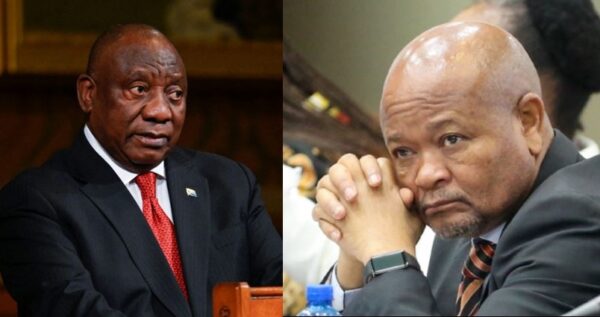
Cyril announced the formation of a judicial commission of inquiry to investigate Lieutenant General Nhlanhla Mkhwanazi
President Cyril Ramaphosa’s decision to place Police Minister Senzo Mchunu on special leave has sparked fierce criticism.
Addressing the nation on Sunday evening, Ramaphosa announced the formation of a judicial commission of inquiry to investigate allegations made by KwaZulu-Natal Police Commissioner, Lieutenant General Nhlanhla Mkhwanazi.
The commissioner recently made headlines by claiming a powerful syndicate involving drug cartels, politicians, senior police officials, prosecutors, and members of the judiciary was operating within the country’s criminal justice network.
Mkhwanazi further alleged that Mchunu had meddled in police investigations and worked to dismantle a task team probing political assassinations in KwaZulu-Natal.
He linked Mchunu to controversial businessman Vusimuzi “Cat” Matlala and claimed that Mchunu was being influenced by Matlala and his associate, Brown Mogotsi.
In response, Mchunu denied any association with Matlala, stating, “I have never met or spoken to him and have never requested anything from him.”
He confirmed knowing Mogotsi but dismissed suggestions of a close relationship.
Following these allegations, Ramaphosa appointed law professor and anti-corruption council chairperson Prof. Firoz Cachalia as the acting Minister of Police.
While Cachalia’s permanent appointment is pending his retirement from academia at the end of July, an interim Cabinet member will temporarily fill the role.
The commission, chaired by Acting Deputy Chief Justice Mbuyiseli Madlanga and supported by advocates Sesi Baloyi SC and Sandile Khumalo SC, will have a wide mandate.
It will examine whether criminal syndicates have infiltrated key institutions, investigate the suppression of cases, probe intimidation of whistleblowers, and assess whether senior officials actively aided criminal operations or failed to act on credible intelligence.
Interim findings are expected within three and six months, followed by a final report with recommendations for prosecutions, suspensions, and institutional reform.
However, the move has been met with skepticism from several political parties.
The DA described Ramaphosa’s actions as an “illusion of reform,” slamming his reliance on commissions of inquiry as a way to avoid executive responsibility.
DA leader John Steenhuisen said, “South Africans have grown cynical of talk shops and task teams that buy time and deliver no accountability.”
The EFF went further, calling Mchunu’s special leave a “cowardly deflection” and accusing Ramaphosa of shielding a corrupt minister.
The party also challenged the legality of appointing Cachalia, who is not a current Cabinet member, arguing that it violates Section 98 of the Constitution, although legal experts note the Constitution does allow for two Cabinet members to be appointed from outside Parliament.
The Good Party also expressed concern, with secretary-general Brett Herron saying the country “does not have time for another commission,” calling it too slow, costly, and ineffective.
The African Transformation Movement echoed the sentiment, describing such commissions as “monuments to inefficiency” and a waste of taxpayer money.
Despite the backlash, Ramaphosa insisted the commission was necessary to protect the country’s democratic institutions, saying, “If these allegations are proven true, they threaten to undermine public confidence in the South African Police Service and our broader justice system.”
He added, “South Africans are rightly concerned about the rise of criminality in our country, from political killings to gang violence and kidnappings. This inquiry is part of our commitment to transparency and accountability.”
Meanwhile, Mchunu has publicly welcomed the investigation and said he is prepared to answer for the allegations.
“Honour and integrity are the virtues I personally subscribe to. I stand ready to respond to the accusations and account fully and honestly,” he said in a statement.
The commission’s formation follows growing public pressure, with the SA Human Rights Commission and several parliamentary committees calling for a thorough investigation.
National Assembly Speaker Thoko Didiza has also tasked multiple committees to review the claims against Mchunu, and Chief Justice Mandisa Maya has asked for supporting evidence to back Mkhwanazi’s explosive allegations.
